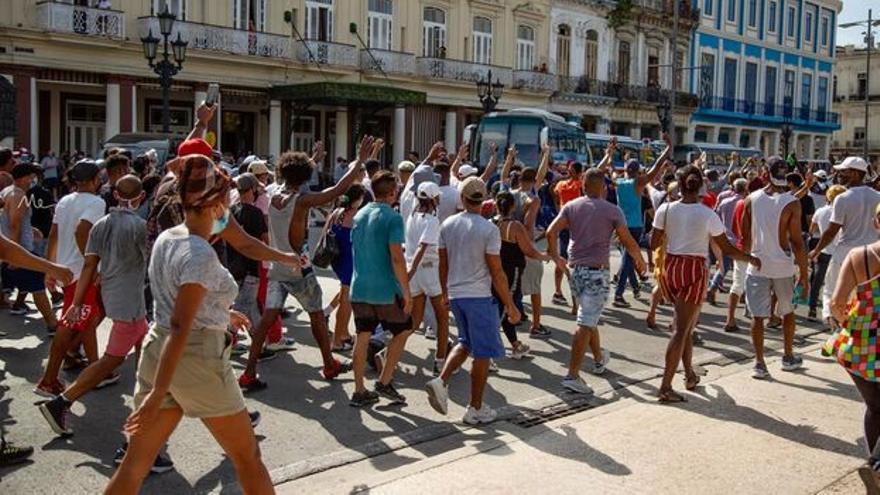
![]() 14ymedio, Yoani Sánchez, Generation Y, Havana, 11 July 2022 — No one foresaw it, no analyst included it in their forecasts, and even the most optimistic had put aside, years ago, the possibility of a popular protest in Cuba. “People have gotten used to it,” “young people prefer to jump into the sea than to demonstrate in a plaza,” “their civic-mindedness has been amputated,” “they have become meek and docile,” were some of the phrases repeated to us from all sides, but the day of 11 July 2021 was enough to destroy all those diagnoses that made us seem like a people unable to raise our voices.
14ymedio, Yoani Sánchez, Generation Y, Havana, 11 July 2022 — No one foresaw it, no analyst included it in their forecasts, and even the most optimistic had put aside, years ago, the possibility of a popular protest in Cuba. “People have gotten used to it,” “young people prefer to jump into the sea than to demonstrate in a plaza,” “their civic-mindedness has been amputated,” “they have become meek and docile,” were some of the phrases repeated to us from all sides, but the day of 11 July 2021 was enough to destroy all those diagnoses that made us seem like a people unable to raise our voices.
That Sunday morning, the spark did not even catch fire in the two largest cities in the country, but in the streets of San Antonio de los Baños, in the province of Artemisa, a community that until then we associated in our minds with the Ariguanabo River, a good-humored town with its international film school and long blackouts. The first images of the popular outrage reached us through Facebook and Twitter, but our own skepticism dampened the enthusiasm and many of us thought that it was just something momentary and small.
Then the demand spread through Palma Soriano in Santiago de Cuba, Cárdenas in Matanzas, different points of Havana and many other regions. What no one had predicted was happening. For many, that was one of the most important days of their lives, to the point that everyone on this Island remembers what we were doing when the demonstrations began. Like the day a child is born to us, a parent dies or a natural catastrophe occurs, 11J has left a mark on our lives.
And then came the repression pushed and propelled by Miguel Díaz-Canel and the “combat order” that he issued before the cameras of national television, a summons that could one day take him before a court to be tried for inciting violence and launching the military against unarmed people. Not only did we see the uniformed officers viciously beat young people and teenagers, but also the official press – which had initially been left without a script and did not know how to react to the people in the streets – begin to try to create a different story, one parallel to the reality.
In that narrative, dictated by the Plaza de la Revolución, the protests were small, violent, carried out by criminals, vandals and the marginalized. To impose this fiction they appealed to the monopoly of television, radio and printed newspapers, but the truth of 11J had already crept into the retinas of millions of people thanks to social networks and the independent press. In the images that came out of hundreds and thousands of mobile phones, we can see a citizenry that once again, after being gagged for decades, proves its civic voice. It was the day we swallowed our fear, chewed it for a long time and realized that we, the dissatisfied, greatly outnumbered the repressors.
After those bright hours, in which the protests showed their libertarian and massive character, the long night of repression arrived, and we continue under it now. But it is enough to remember that Sunday last summer to conclude that Cubans are no longer the same. We have shouted in the streets, we have chanted freedom and we have shown the world that we are neither cowards nor bowed down, just that a calculated dictatorship has prevented us from taking our places for a long time. The next outbreak will also be neither announced nor predictable, but it may be the last time the regime can crush the unrest and respond with punches, gunshots and trials. On 11J we also learned that fear changed sides.
____________
Editor’s Note: This text was originally published in DW in Spanish.
____________
COLLABORATE WITH OUR WORK: The 14ymedio team is committed to practicing serious journalism that reflects Cuba’s reality in all its depth. Thank you for joining us on this long journey. We invite you to continue supporting us by becoming a member of 14ymedio now. Together we can continue transforming journalism in Cuba.
